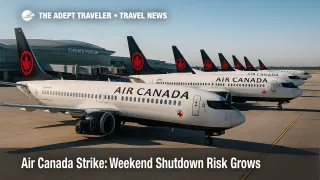Air Canada strike: weekend shutdown risk grows

Air Canada and its flight attendants are still at an impasse despite a federal plea to avert a stoppage, and the carrier has expanded preemptive cancellations. The union's strike window opens just before 1 a.m. Eastern on August 16, with Air Canada warning it could suspend most mainline and Rouge operations as part of a phased wind-down. Limited Express flying may continue, but rebooking space is tight at peak season, and travelers should expect knock-on delays at Toronto Pearson International Airport (YYZ), Montréal Pierre Elliott Trudeau International Airport (YUL), and Vancouver International Airport (YVR). A government decision on arbitration remains in play.
Key Points
- Why it matters: Up to 130,000 travelers a day could be affected if operations pause.
- Travel impact: Hundreds of flights were canceled in advance, with a wider shutdown possible August 16.
- What's next: Strike is slated to begin at 12:58 a.m. ET Saturday, followed by a company lockout shortly after.
- Fee-free changes apply for many tickets issued by August 14 for travel August 15 to 18.
- Some Air Canada Express flights may operate, but capacity is limited.
Snapshot
Air Canada has begun an orderly wind-down to avoid mid-journey strandings if the strike proceeds. Customers ticketed by August 14 for travel August 15 to 18 can change dates without a fee, including to later windows between August 21 and September 12, or opt for a travel credit or refund where eligible. The airline cautions that summer demand limits rebooking availability. Government officials have urged both sides to settle, while Air Canada continues to seek a referral to binding arbitration. Travelers connecting through YYZ, YUL, and YVR should build extra time, monitor app notifications, and secure backup routings where possible.
Background
Talks cover roughly 10,000 flight attendants at Air Canada and Air Canada Rouge represented by CUPE, who secured a 99.7 percent strike mandate. The core dispute centers on wages and pay for ground duties such as boarding time, which the union says remain unpaid for dozens of hours monthly. Air Canada says its latest proposal lifts total compensation by 38 percent over four years, while CUPE contends the effective wage increase is much lower. After the company declared an impasse and the union issued a 72-hour strike notice, Air Canada served a lockout notice and began canceling flights ahead of the weekend.
Latest Developments
Cancellations expand, fee-free changes open
Air Canada's advisory confirms a phased wind-down and details for itinerary changes. Customers who booked by August 14 and are traveling August 15 to 18 may rebook to August 15 or to dates between August 21 and September 12 at no charge. Nonrefundable fares can be canceled for an AC Wallet or Future Travel Credit, and Aeroplan award tickets can be changed or canceled without a fee. If a flight is canceled due to the labor disruption and rebooking is not feasible within a reasonable timeframe, a refund is available. Expect limited partner capacity during peak travel.
Ottawa urges deal as strike, lockout times set
Jobs Minister Patty Hajdu has pressed both parties to keep negotiating while reviewing Air Canada's request for federal intervention. The strike is scheduled to begin at 12:58 a.m. Eastern on August 16, with the company's lockout to follow 32 minutes later. Reuters estimates up to 130,000 daily passengers could be affected if the shutdown proceeds, with Air Canada Express covering a fraction of demand.
What still flies, and where to look for seats
Regional services branded Air Canada Express and operated by Jazz and PAL are expected to continue, offering limited connectivity on shorter routes. Even so, available seats across partners will be scarce. Travelers connecting through Calgary International Airport (YYC) and the largest hubs should verify whether their flight is mainline, Rouge, or Express, and confirm the operating carrier on any codeshare.
Analysis
For travelers, the staggered cancellations are designed to minimize mid-trip strandings and preserve aircraft positioning for a faster restart once a deal emerges. The trade-off is discomfort now, in the form of earlier notices and harder-to-find seats through the weekend. Because Air Canada's network is hub-and-spoke, the biggest pain points will cluster at YYZ, YUL, and YVR, where long-haul banks depend on finely timed turns, adequate reserve crews, and ample gates. Transborder flows into United States hubs will ripple as well, as Star Alliance partners juggle swapped equipment, blocked codeshares, and crew-duty limits. The fee-free change window is a meaningful outlet for those with flexibility, but the practical limit is inventory. If you must travel, lock in alternatives quickly, ask about partner reaccommodation, and document expenses on international trips for potential Montreal Convention claims. A government-ordered arbitration would likely cap the disruption, but absent that, the stalemate raises the odds of a multi-day recovery even after the first flights return.
Final Thoughts
If you are booked on Air Canada through August 18, use the waiver to move your dates, confirm whether your segment is mainline, Rouge, or Express, and watch your app for rolling reassignments. Build buffers at YYZ, YUL, YVR, and YYC, line up backup options on partners, and be ready to choose a refund if rebooking stalls. These steps will help you stay ahead of the Air Canada strike.
Sources
- Labour disruption by Air Canada flight attendants, Air Canada
- Air Canada, union deadlocked despite government plea to avert Saturday strike, Reuters
- Air Canada work stoppage looms, what you need to know, Reuters
- Air Canada cancels flights from Thursday as cabin crew strike looms, Reuters
- Air Canada begins canceling flights ahead of possible strike, CBS/AP
